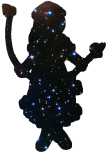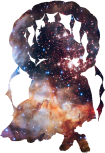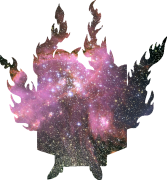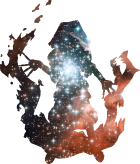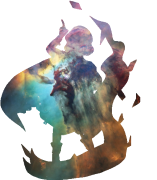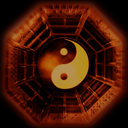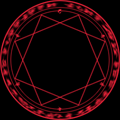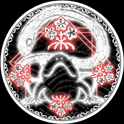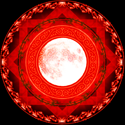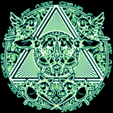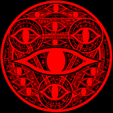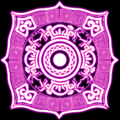Autumn Equinox Letter - Tai Chi, Touhou 20 & Thoughts - 22nd of September 2025
A whole year has passed since the Archive was established, and the autumn equinox is with us once again. This is the time for harvest, and this article is a kind of harvest of its own. I explore the effects of doing Tai Chi for a year and meditation for about a year and a half. After that, I offer a short review of Touhou 20, paying special attention to its ritual-like qualities and the appearance of a new manifestation of the Suwa myths in Touhou canon. A very recent and extremely impactful development was me taking shamanism from reading about it to experimenting with it. The results were tremendous and deserve a much longer writeup and integration into the larger framework of this site. To wrap up this grab-gag of an article, I give some thoughts about the future course of the Archive, what that “the esoteric in Touhou” might ultimately be and the possibilities and challenges of a Touhou-inspired spiritual path.
Tai Chi
As of writing this, it has been more or less a year since I started practicing Tai Chi. The journey has not yet taken me very far - learning all of the long form takes about three years or so - and it has had its ups and downs. Sometimes I have not been very committed to it, finding it very hard to see the benefits. Other times there have been great bursts of progress and inspiration. As much as I am a beginner, there have still been some rather notable changes.
The most obvious and mundane of these changes are improvements in my balance and mobility. Tai Chi has a number of rather challenging moves, such as turning yourself while standing on a single foot. These moves were borderline impossible for me in the beginning, yet now I find them if not easy then at least manageable. I have also found that parts of my body are much more mobile than before, including my hips and my stiff left shoulder.
Another change is increased body awareness. I feel like for a very long time I was kind of brute forcing even pretty ordinary movements, pushing against myself, using my arms or legs in weird positions, needlessly tensing parts of my body. I have noticed a dramatic decrease in back and neck and shoulder pain after taking up Tai Chi.
The third change I have noticed, or perhaps intentionally started practicing, is a kind of unclenching. Very early on I started noticing that in everyday life I constantly sucked in my abdominal muscles, to the point this was causing nausea and dizziness at times. This I feel contributed to a kind of embodied unease and anxiety. I started doing my best to relax every time I found myself doing this. I still sometimes find myself catching tensing up my abdominals, but it’s nowhere as bad as it used to be. Recently I have started noticing other muscle groups I have needlessly tensed in certain situations, such as shoulders or various lower body muscles. Learning to relax my body has made many things just kind of flow better.
Beyond these changes things move into a much more fuzzier territory, the kind of territory where Chinese classical writers would conjure up the term energy, chi, to describe these phenomena. Some of these changes are also very difficult to untangle from other practices and life changes, but that’s simply how things are - practice, no matter what it is, bleeds outside of the time allotted for it.
The first one of these more unusual changes is an awareness of this “energy” and where I am in any given moment in my body. I’ve started noticing that by default “I” kind of lingers around in my middle body, perhaps roughly where the Chinese would find the dan tien and the Japanese the hara. When I get lost in thoughts the “I” is in the head, at times it almost feels like outside of it, pushing out of the “third eye”. In some way “outside” and “inside” have kind of swapped their conceptual places. “Going into myself” is a deeply embodied state where “I” sits in the body and is present, and getting lost in thoughts is like floating out of this embodied state. I have sometimes experimented with shifting this awareness, mostly towards the ground as means of grounding, but also pushing myself to the “third eye” or top of my head. Some of the results are very interesting but a bit inconclusive.
This sensitivity to “energy” is perhaps what contributed to some of my experiences in Japan, though I also think practicing meditation more or less for a year and a half also contributed to this. Point being, it isn’t just some internal, personal thing, but also something that exists outside of me, between different kinds of things. Sometimes it manifests as pretty banal “vibes”, and with these it’s perhaps more that I don’t feel so clouded by latent tension, anxiety or hostile preassumptions. Other times it is really something much stranger and numinous, feeling that “It”, a kind of extra “denseness” or “meaningfullness” of reality.
There is one last thing worth mentioning, and this is less of a personal change but unusual experiences in the Tai Chi classes and intensives. This deals with chi being manifest as something that can be sensed in other people or even made to affect them. These experiences have been annoyingly sporadic, sitting just at the threshold of being explainable by complex coming-togethers of mundane factors. Become relaxed enough to be gently pushed, reactive enough to be swayed just by a sharp exhalation, and when it comes your time to “push”, you are focused enough to do it…
…but then again, I have been on the receiving end of projected chi three times, and these were instances where an advanced practitioner did not visibly breathe or even move. I felt a kind of surge of tension, pressure and slight heat. The first time this happened I had a very grounded stance and as I felt it, I noticed it but was not pushed by it. The practitioner told me “you should let it pass through you”. On the second try I was more relaxed and felt the wave gently push me a bit back. Afterwards I felt a bit strange, overly energetic for around 15 minutes and sweated more than usual. Did my stance end up with me absorbing the projected chi? Maybe. The third time was later, and it was an experiment where the practitioner faced away from me and I held my hands on their shoulders. That time too I felt a notable but not overwhelming wave of pressure and heat, and allowed myself to be swayed. If nothing else, these have been very unusual experiences.
Meditation
Now that meditation has been mentioned several times, perhaps it’s good to write a bit about this, especially since it’s something I have so strongly encouraged on this website. As I wrote, I have now practiced it for about a year and a half, more or less consistently. Sometimes it’s been decidedly “less”. Going to Japan completely demolished my practice schedule, both for Tai Chi and meditation. Building it back up has been something of a struggle. It’s so paradoxical. When I do it, it’s usually pretty great these days and I’m left wondering why I just don’t do it, yet sometimes it just is so hard to push myself to do it.
I would say my journey with meditation started with a point where I struggled to even sit down for 10 minutes. For the first several months I mostly struggled to keep the schedule, to build up to consistently meditating for 20 minutes and with finding a good posture. It wasn’t easy, but some of the early benefits started manifesting rather quickly. I felt less latently nervous. My head was less of a constant beehive of churning thoughts and concerns. There started to be these kinds of quiet moments where I was actually present at the moment, if just for a bit.
So far I would say the later half of my meditation journey so far has been mostly elaboration on this. The 20 minutes have become the norm and not the exception, I no longer mostly struggle with the posture, my mind is generally speaking a lot less cluttered and there’s a bit more of those present moments. And then there are of course days when I can’t bring myself to do it, when my leg goes numb and when I’m swept up in the maelstrom of everyday life.
There’s of course been a number of odd experiences, altered states of consciousness, weird energetic and bodily sensations, outsiders wanting to get in, but these tend to be exceptional events. Most consistent of these are changes in state of consciousness and these are unfortunately very hard to describe. The various bodily energetic sensations, like feeling hot, cold or electric sensations in the body or a kind of magnetic field around my body are becoming increasingly common. I think meditation has a kind of energy work aspect to it, but it tends to go kind of unspoken about.
I recently joined a local Zen community to practice zazen in longer sessions. While I have done these less than I would like to admit, there’s some remarkable features to these 40 + 40 minute sessions. It really isn’t just 20 + 20 + walking meditation + 20 + 20, and it really isn’t just a “long 20 minute meditation session”. The most notable observations so far are that it’s ridiculously easy for various strange optic phenomena to manifest on the walls we stare at, and that the long sessions make this certain wavy nature of human consciousness much more notable.
It’s fascinating how the state of perception where strange patterns emerge by themselves hides just behind staring at a wall long enough. As for the “waviness” of consciousness, you become much more aware how you just constantly phase in and out of these various body-mind states during the ~80 minutes of zazen. The optic patterns emerge, vanish as you either sink into your body or go into thoughts, only for you to get pulled back to the optic world again, only to go elsewhere again…
I recently had some kind of minor breakthrough of sorts. At some point I realized I don’t really know what the wall in front of me at the zendo looked like anymore. I was on maybe the 70th minute of 80 minutes of zazen, and the wall had gone through tens if not hundreds of cycles of visual distortion.
After I left for home I found myself paying particular attention to my surroundings, and I realized that outside of the tiny slice of perception happening right now, that too subject to all kinds of distortion, I really don’t remember how things look like or are. There are buildings I have passed by hundreds of times, and in that moment, I saw new things in them, paid attention to how the bricks are laid, or the types of decorations on them, or the shades of colors of the walls. It made me remember how confused I was when coming home from Japan because my home city of 14 years looked so unfamiliar. We really don’t see, let alone remember, things as they are.
The longer sessions have also made me wonder more about what exactly is this meditation thing, what can it be used for, and where will it eventually take you. I’ve stuck at it for the rather immediate benefits, and I will stick to it. It just feels like there is much more to it than I initially suspected, but what that “much more” exactly is remains to be seen.
Touhou 20
Moving into a wholly different subject, I would like to share some thoughts about the latest Touhou game. The game was marred by AI controversy surrounding it when the trial version was released, and some of the discourse carried over to the release itself. ZUN himself said the AI-generated elements were used in it for a reason, and sure, AI is featured in the story in an antagonistic fashion.
The plot of the game is basically as follows: the Lunar Capital is being overwhelmed by “life information”, also explicitly referred to as Big Data. They have been processing Outside World information using a pyramidal structure under Gensokyo, where Asama Yuiman, as deity repurposed into an information filter, has been producing “truth” from the mass of data. However, as the amount of data generated by Outside World has grown, it has overwhelmed Yuiman. To stop the kegare-riddled (we all know how cursed Twitter timelines are) life information from overwhelming the Lunar Capital, the Lunarians unseal Iwanaga Ariya, and unchanging goddess of eternity, and doing so Gensokyo goes into an unchanging stasis.
AI is present in the plot on multiple levels. Yuiman is a kind of an AI, but the tide information is also likely intended to reflect on the very real tide of AI-generated content. To me, it still feels like the ludonarrative reasons for using generative AI don’t quite 100% click. There’s an unpleasant undercurrent that feels like ZUN is just tired of making certain kinds of assets that contributed to the charm and soul of some of the older games. It’s a shame.
The broad narrative focuses on themes of change vs stability. The Lunarians represent a kind of remote, out of touch nobility that is threatened by change who wish to stop it. You can read this as a political allegory if you would like, and perhaps ZUN considers the Japanese establishment to be insular and backwards-looking. Or then it can be seen in a more broader mythopoetical sense, as every society everywhere has always had elements that resist any change to the very end. I think it plays on traditional Japanese thinking, where perfection was seen as a kind of stasis equal to death. The game very explicitly says that an unchanging state is one of death.
The endings hold a threat or promise of change coming to Gensokyo, and that it’s in the nature of Gensokyo to change. This is true if you look at the history of the canon Touhou works. The depiction of Gensokyo has changed over time, often going into contradictory directions. The amount of inhabitants there has grown, some have risen to center, and others receded to the fringes. And every time Gensokyo has changed, someone has resisted it and been upset about it.
Some of the narrative elements in the game paint a kind of finality and passing on the torch. In a (as of writing this) recent stream ZUN said that he is OK if Touhou 20 is the last Touhou game. The Wonder Stones seem to represent fanworks, and the four colors and emotions associated with them seem to represent the various tones that fanworks have taken. So perhaps Touhou 20 is meant to invoke hope that fanworks will carry on Touhou in the future, especially with some of the choices in the game feeling like ZUN is exhausted.
Both Fossilized Wonders and Whispered Oracle of Hakurei Shrine had a strangely ritual-like nature to them. I would argue that these kinds of aspects really started emerging to some official Touhou works with Unconnected Marketeers, with its fourth wall blurring and Chimata talking about “everyone loving the characters of Gensokyo” and the ability cards being essentially collectibles. In Touhou 20, invoking the princess of eternity seems like an attempt at bringing stability to Gensokyo, to Touhou. At the same time Gensokyo cannot exist in stasis, and perhaps Gensokyo can not exist as a single man’s effort either. Themes of change, resisting or adapting change, changing form to adapt, to avoid being forgotten are very central to Touhou. Touhou 20 really captures something central about the franchise at large.
There’s some tantalizingly bizarre strands in Touhou 20. The “life information” tainting Gensokyo and Lunar Capital, spirit worlds, the Western-coded, Venusian conspiracy youkai born of an ocean of data…The idea that the barrier between Gensokyo and Outside World is weakening or threatened seems to form an increasingly large part of the franchise’s overall narrative.
The idea of outside forces flooding Gensokyo is perhaps a reference to how ZUN hopes that fanworks will carry the franchise on in the future, with their multitude of competing, contradictory interpretations that will inevitably “corrupt” or “taint” the canon. But it also raises an interesting question - if the “barrier” now becomes more porous, will Gensokyo then also flood the outside world? While there are people who all the way back before the 2010s started paying attention to the spiritual dimensions of these games, it does feel like the spirits of Gensokyo have become much louder and more active in the recent few years. Perhaps this is in line with the passing of the torch, perhaps they sense that a single man can no longer carry it so much anymore…
It’s hard to say. What I found very interesting though is that the game features yet another incarnation of the Suwa mythology, in the form of Asama Yuiman. You can read a much fuller writeup in an article here, To put it short, she is based on the character of Yuimanhime who appears in the legend of Koga Saburo. This legend is one of the stories around the Suwa kami, and features a warrior who ends up in an underground world and returns as a serpent. Her deer hunting aspect is particularly interesting. I don’t know how long the development cycles of Touhou games are, and it’s entirely possible she was directly influenced by the Shika no Kuni documentary, which exhibits the culture and faith of Suwa. The documentary prominently features deer hunting. If it’s not a direct influence, it’s fascinating convergence. Seems like the Suwa kami has become louder, at least temporarily. Why this has happened is a difficult question to answer. Maybe the stars are right?
On a purely gameplay level I find it fun and enjoyable but extremely challenging beyond Easy. I’m not a very good player, and Touhou 20 is the most extreme example of the post-Legacy of Lunatic Kingdom development where the Easy modes feel easier than pre-LoLK games Easy, but the difficulty increases very steeply from that onwards. There are Touhou games which have easier Hard modes than this one’s normal, I think. The game is rather generous and there’s some cheeseable combinations of the stones, so it’s not so raw or hopeless either. It’s a bit unbalanced and imperfect, but hey, perfection is stasis and death, and I’ve enjoyed my time with it greatly.
Shamanism
I’ve been recently quite immersed in shamanism, not only through Carmen Blacker’s excellent book The Catalpa Bow, but also by trying it in practice. I will be rather sparse on details as shamanism is inevitably entangled with local tradition, and I don’t want to reveal where I live. That said, it was an experience that had an extremely rough start that however allowed for several major breakthroughs. I feel like I found some kind of a missing piece that has allowed me to understand basically everything in life much better.
In one of Akatsuki Record’s songs Stack sings something to the effect that the Land of the Backdoor is “on the other side of a breath”. I probably have higher than baseline talent for the shamanic practices due to previous experiences, but it was ridiculous how easy it was. “Going there” might be for those willing to commit to a bit of practice so easy that most would reject it out of sheer disbelief.
Before the workshop I wondered if I would end up in realms or see figures associated with local traditions or Japan. It ended up being mostly from the Japanese side of things. I’m extremely hesitant to say I “went to Gensokyo”, but I went somewhere where I met several kami represented in Touhou. They appeared in forms more or less conforming to their in-game presentation. I also met a Buddhist deity associated with a ritual I took part in while in Japan, but who is not represented in Touhou. During the last spirit journey I got whisked away to unmistakably local realms and saw a figure I could not identify. Between the journeys I also perceived some spirit animals that have prominent roles in local mythology, and they turned out to be associated with the teacher of the workshop.
The workshop also demonstrated really well that there really isn’t any separation between “here” and “there”. The spirit world isn’t somewhere else, it saturates all of reality, not bound to the confines of linear space and time, yet still shaped by it. The practices we undertook also demonstrated to me that the energy, chi, power, whatever you might call it, is also not separate from very “mundane” things like dancing, singing or using your body. There really is so, so very little separating the mundane from the super (or infra?) mundane.
I also understood more clearly what has been happening to me as a kind of process where my consciousness has been leaking out to other realms of reality in a largely uncontrolled fashion. I feel like I have now been given much better tools to engage with this in a conscious manner. It’s also good and necessary to find ways to be grounded and set boundaries, both in a mundane and numinous manner - these two also may not be so very separated.
I could write a lot about this, and I probably will. I would however like to wrap up this section with some brief thoughts on Touhou as a form of shamanic art. ZUN has now himself pretty much said out loud that it’s channeled: “the characters decide when they want to appear”. This is on top of the older things he told at the footnote of the Symposium of Post-Mysticism about “troublesome ones that seem to move on their own”. Beyond ZUN’s own creative approach, Touhou itself has a number of shamanistic features.
These include things like the player characters being kind of spirit guide archetypes, travel to other worlds being a constant theme, Gensokyo’s hallucinatory geography, the Youkai Mountain acting as a kind of World Tree, the separation of Gensokyo from outside world by a “Barrier of Common Sense” and how from Unconnected Marketeers onwards the Outside World has been simply implied to be our world. Touhou’s strange unchanging, yet changing chronology, accessible even in the far future of the Hifuu Club and the stories' preference for exploration of different themes and mythologies over linear narratives are shamanic qualities.
Outside of the explicit mythopoetic qualities, there’s some which are probably entirely “accidental” in the sense that ZUN wasn’t trying to go for them. Gensokyo is a fantasy land which can be reached through the “gaps” of a powerful older woman. However, if you are not capable of dealing with spiritual hazards, you will “get eaten by youkai”. Take away the specifics, and these themes of spiritual power associated with women, as well as terrifying hazards associated with being unable to live up to the challenge posed by spiritual forces, are about as old as time itself.
These shamanic qualities of Touhou are more than deserving of a further writeup and integration into The Esoteric in Touhou, so I will refrain from adding more length to this article.
Thoughts
I’ve started a broad rework of this site. Since the first iteration of this Archive appeared, I have learned much and an update is necessary. Some of the sections feel embarrassingly bad in light of new understanding, there are some pretty big oversights. On the other hand, it’s not all bad. It feels like I circled the target, what this “esoteric in Touhou” is, but I did not quite hit. To be honest, “the esoteric in Touhou” might turn out to be this kind of microcosmic mandala that can radiate history, connections and meaning in all directions until Touhou becomes just a tiny speck of foam on the crest of a wave. So a kind of boundary must be drawn for what is to be included, and therefore a kind of state of completion. When this will be achieved, I don’t know. It might be very far away in the future.
What is that esoteric in Touhou ultimately? I don’t know it fully yet, but I suspect it has much to do with liminalities, cycles, connections, renewal, change, the eternal return, archetypes, taking part in the co-creation of the world and how the Land of Illusions and Land of Original Creation and Land of the Backdoor and all these other places are so, so close to us, yet so hard to reach. And how it is possible to tap into all of these things, just as people have done for millennia in various forms, and to do something with it. Something that makes an actual difference in not just a single individual’s life, but in a broader context.
It’s something that restores the soul to the world, and doing so, restores the soul to you. And when the soul is restored, Gensokyo becomes something that’s everywhere for those with the eyes to see. Not in some kind of delusional, hallucinatory way, but that the qualities of Gensokyo are outside of it too, the wonderful, the mysterious and the terrifying. Touhou might be otaku media, a product of a profoundly escapist subculture, but in some strange way, wrapped inside the poison of escapism might be the very antidote to it. Something that beckons on to dig deeper towards the roots, to “touch grass” as kids these days say. There’s something genuinely eternal at the core, and all the endless passion and love, in more or less wholesome ways, is an attempt at connecting with that something.
I leave myself with the possibility of it being something even more, or something completely else.
Even if I miraculously completed The Esoteric in Touhou relatively soon, I would not abandon this project that has started to shape up to be much more than just the efforts of a single person. I just hope that there will be a point where one of my selfish Ten Desires, “writing a book”, will be done in the form of completing The Esoteric in Touhou. This would free up energies for other kinds of creative, collaborative ventures with others. And writing essays, I suppose. And perhaps I will decide to do a deep dive into the finer particularities of some legends or others. Who knows…
I feel like the year that has passed has seen a kind of vibe shift. With ZUN basically saying he channels Touhou, the increase in interest towards the mythological basis of Touhou and the clearer emergence of a broader kind of neo-animist movement, I feel like information that was kind of groundbreaking a year ago (“Spirits of Gensokyo are real and ZUN channels them”) is now just kind of…out there. Some will accept the numinous in Touhou (and the world), some won’t, and some of those who won’t will not change their minds from a dozen setsubuns, ten weirdly ritualistic pieces of Touhou media or hundred people’s experiences.
Sometimes I feel like after all that has happened, on some level after ZUN made a divination book and said "the characters choose when they decide to appear", there's just not much to discuss. I could endlessly catalogue and cross-reference the mythological references, pick apart the worldbuilding, but on some level there's no reason to do it for anything else than the love of the game at this point. And don’t get me wrong, I love the game.
It’s just that the more I understand what exactly the spirit world is, what the esoteric in Touhou might be, and that ZUN really, truly channels it, the questions that arise are no longer in the realm of “is this real” and “if this is real how do I prove it”.
Instead the question is: what now?
I think ZUN isn’t the only one who can tap into the gensou shamanism, but as there really is no difference between “here” and "there” the things you can do with it can look rather mundane. Already countless amounts of people are making fan art and fan games, adding their own perspective to the kaleidoscope, becoming part of the weave, the musubi, of Touhou. In Japan this has resulted in some 2nd generation Touhou fans being born to parents who met through the fandom. Touhou has, for some, even fulfilled the most traditional roles of mythology by bringing people together and facilitating life going on.
There are less mundane possibilities, but ultimately these might end up being disappointing to some who would like to “go to Gensokyo”. It seems increasingly likely that Gensokyo is likely a particular manifestation of some much larger and weirder interstitial spirit world, and accessing it might be much easier than most dare to even dream about. However, permanently migrating there is likely impossible. You can't escape your problems there.
So the question then is, if you can't do that, do you even want to go there as a visitor who can't stay?
I think there is much to be learned from there, it after all hosts or facilitates access to some pretty profound entities. But you have to paradoxically be rather un-escapistic to really harness it. You have to bring Gensokyo to the Outside World, and it might ultimately end up looking a lot like what people are already doing, the work of making art, creating their own flourishes to the mythology, finding comfort, connection and community, taking part in the cycle of life.
If you look at Touhou, the one big repeating theme is the threat and possibility of change. You have to change yourself or you will vanish. Touhou has to change with every iteration, and with every iteration someone is upset about it, as their idea of “Gensokyo” is challenged. Yet that idea was nothing but a transient manifestation of something much eternal in the moment. Touhou 20 is extremely explicit with the themes of change versus eternity, preservation vs adaptation.
The path of gensou shamanism as shamanism might be too much for many to handle. It challenges extremely established ideas about how reality works. Any serious and even relatively unserious attempts at spiritual growth will draw in resistance and adversaries, both internal and external. Often the internal ones are the hardest and most difficult ones to work with, and I am still very, very bad at it. There are many people in the community who could enter the path with wrong motivations and have a terribly bad time and come off worse from it. That said, I do believe there is value with spiritual practices and approaching life with a more animistic attitude, even if one never fully took the plunge.
This path might also require a more devotional approach, surrendering to higher powers and truly digging through the mythological stratum and thinking about profoundly unexciting matters like “what is the right way to live”. But how many of you really want to commit seriously to Eightfold Path, or to the Tao, or try to be assimilated into Shinto? These things are not an escape either. They are potentially a completely radical upheaval of your worldview. I believe it's an upheaval everyone should go through, but I am essentially a religious extremist. At the same time, I increasingly realize that human life is precious and fragile and people should not be hurt in a pursuit of making them “awaken”.
In the end, Touhou is ultimately just a new iteration of ancient mythologies, which have their core, and the fringe. Most people have always been satisfied with the fringe - the tales of men and monsters, myths of gods and goddesses, legends of people of note, treasures, miracles, art, hells and heavens, the spectacle of rituals and the sense of community. Reaching to the very core, it has always been for the very few.
You really have to ask yourself.
Do I really want to dig to the core?
A lot of you really don't want to dig. But some of you are sick with that fever. You can't stop digging, it's like you're missing a tooth and can't stop licking the hole. You are sick with the shaman’s sickness. Maybe you were one of those neurotic and sickly children, your energies misaligned, waiting for something to rupture and set you straight. Maybe you have been driven to a corner, maybe you are one of those who will awaken simply because they just can’t take the pain anymore. Maybe you are one of the nympholeptics, feeling like your missing half is out there somewhere, not here. Maybe this world cruelly took something from you that was your beautiful birthright and you have been desperately seeking that connection ever since. Maybe you have the dreams, already traveling even if you don’t know it yet. Maybe you too make art or games or write and feel like the characters decide when and how they want to appear. Or maybe you are one of those undeniably born to walk the path and the numinous has always been part of your life, the visions and strangeness too present to ever deny.
Whatever your exact background is, you are one of the ones who can see The Esoteric in Touhou, feel the numina. And whatever your reason is, it appeals to you more than the established paths. Perhaps the conventional depictions and ideas of gods and buddhas and sages are too distant, too soaked in blood and dirt and grime, sinking into the depths of history, tangled in the endless burdens of earthly politics and family reasons and unskilled means at driving the lessons home. Perhaps your roots are so cracked that you have become a sick little tree that needs to be planted in a more nurturing soil. Perhaps they just simply speak your language, look to you as spirits and gods should look like.
Whatever your drive, whatever your reason is, for you, I wish a good and straight journey. Millions walked it before you, there is very little new under the sun, and the same sweet bananas that rotted your forefather's teeth will also rot yours unless you become wiser. You have to abandon so much of your current burdens to walk the path without sinking. Don't fall for escapism, don't look for quick fixes, don't get bamboozled, live a moral and pro-social life, do the work, do it consistently and keep going.
The gods are waiting for you.
Best regards
-Emissary
